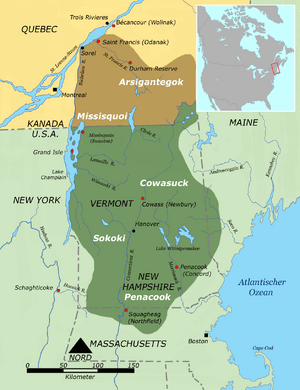Cowasuck facts for kids
The Cowasuck people, also known as Cowass, were a Native American tribe. They spoke an Algonquian language. They were part of the Western Abenaki group. They also belonged to the larger Abenaki Confederation. Today, a group called the Cowasuck Band of the Pennacook-Abenaki People represents their descendants.
Contents
What's in a Name?
The name Cowasuck comes from the Abenaki word Goasek. This word means "white pines place." It refers to an area near Newbury, Vermont. The people of the tribe were called Goasi. The plural form, Goasiak, means "the people of the white pines." You might also see other names for this place, like Koés (French) or Cohass, Cohoss, and Coos (English). Another name for the people was Cohassiac.
Where the Cowasuck Lived
The Cowasuck people used to live along the upper Connecticut River. Their main village, also called Cowasuck, was located where Newbury, Vermont, is today. This area is in both New Hampshire and Vermont.
The river valley had many trees. There were deciduous trees, hemlocks, and white pines. These trees grew well in the light soil. Cowasuck villages were often built on the edge of a cliff. This spot was good because it was near rich land for growing corn. It also had a good water supply. All their villages were close to a river or lake. These waterways were important for fishing and for travel.
Their homes were called wigwams. They were shaped like rectangles and covered with bark. The roofs were domed and had a hole at the top. This hole let out smoke from the fire inside. Each wigwam was big enough for several families to live in.
A Look at History
The best early stories about the Western Abenaki came from the French. The French saw them as friends and people who became Christians. However, the French sometimes called the Cowasuck by other names, like Penacook or Sokoki. This caused some confusion in their reports. Because of this, the different Western Abenaki groups were often known by their village names.
French Missionaries and Friends
The first French priests, from the Jesuit Order, arrived in New France around 1611. Unlike some other European groups, the Jesuits did not try to make the Native Americans act like French people. Their main goal was to share their Christian faith. We know from Abenaki stories that French missionaries were active in Abenaki villages by 1615. These villages were on the shores of Lake Champlain.
Jesuit priests often worked as more than just religious leaders. They also acted as helpers for the French government and military. They traveled alone through Native American lands. They visited Abenaki villages and lived among the people. Some of them, like Father Sébastien Rale, became very knowledgeable about Native American culture. He even created a large dictionary of the Abenaki language.
The missionaries learned the native languages. They adopted the way people spoke. They tried to follow local customs as much as possible. They were not interested in taking Abenaki land or in the fur trade. The native people respected their simple lives and strong beliefs. They also admired their courage. The missionaries seemed unaffected by diseases that local healers struggled with. They shared the lives of the Native Americans and earned their trust.
These missionaries also helped the Abenaki. They acted as lawyers for them. They helped them understand the differences between Native American and European cultures. Sometimes, they even represented the Abenaki in talks with the English. People like Sébastien Rale became very important in the Abenaki story. Soon, the Abenaki were known as loyal friends of New France. They were also known as very devoted Catholics.
The Cowasuck Today
Today, the descendants of the Cowasuck people live in small groups. They are mostly found in New Hampshire and Vermont. Neither New Hampshire, Vermont, nor the United States government officially recognizes their land claims. They also do not recognize the Cowasuck as a separate tribe.
The Cowasuck, now part of the Cowasuck Band of the Pennacook-Abenaki People, have tried many times to claim parts of their old lands. So far, all these claims have been turned down.
 | Janet Taylor Pickett |
 | Synthia Saint James |
 | Howardena Pindell |
 | Faith Ringgold |


